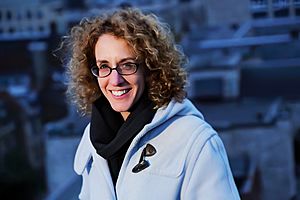Victoria Kaspi facts for kids
Quick facts for kids
Vicky Kaspi
|
|
|---|---|
 |
|
| Born |
Victoria Michelle Kaspi
June 30, 1967 |
| Alma mater | McGill University (BS) Princeton University (PhD) |
| Known for | Canadian Hydrogen Intensity Mapping Experiment |
| Spouse(s) | David Langleben |
| Awards |
|
| Scientific career | |
| Fields | Pulsars Neutron stars Astrophysics |
| Institutions | McGill University California Institute of Technology Jet Propulsion Laboratory Massachusetts Institute of Technology |
| Thesis | Applications of pulsar timing (1993) |
| Doctoral advisor | Joseph Taylor |
| Doctoral students | Anne Archibald |
Victoria Michelle Kaspi, born on June 30, 1967, is a brilliant Canadian scientist. She is an astrophysicist and a professor at McGill University. Dr. Kaspi spends her time studying amazing objects in space called neutron stars and pulsars.
Contents
Becoming a Scientist: Early Life and Education
Victoria Kaspi was born in Austin, Texas, USA. When she was seven years old, her family moved to Canada. She completed her first university degree at McGill University in 1989.
After that, she went to Princeton University for her advanced studies. She earned her PhD in 1993. Her supervisor was Joseph Taylor, a famous astrophysicist who won a Nobel Prize.
Exploring the Universe: Dr. Kaspi's Career
After finishing her studies, Dr. Kaspi worked at several important places. These included the California Institute of Technology, the Jet Propulsion Laboratory, and the Massachusetts Institute of Technology. In 1999, she returned to McGill University as a professor.
At McGill, she became one of the first professors to hold a Canada Research Chair. This is a special position for top researchers. In 2006, she was named the Lorne Trottier Professor of Astrophysics. She is also a Fellow in the Canadian Institute for Advanced Research and the American Astronomical Society.
Discoveries About Pulsars and Supernovae
Dr. Kaspi uses powerful telescopes to study space. One of her big discoveries involved a pulsar linked to a supernova remnant called G11.2–0.3. This remnant is in the constellation Sagittarius. Using the Chandra X-ray Observatory, she found that the pulsar was exactly in the center of the supernova. This supernova was first seen by the Chinese in 386 CE.
This was only the second time a pulsar was found to be clearly linked to a supernova remnant. The first was in the Crab Nebula. Dr. Kaspi's work strongly supported the idea that pulsars are formed from supernovae. Her findings also made scientists rethink how they dated pulsars based on their spin rate. Old methods gave ages that were much too high.
Understanding Magnetars and Fast Pulsars
Dr. Kaspi's research with the Rossi X-ray Timing Explorer helped explain two types of space objects. These are soft gamma repeaters and anomalous X-ray pulsars. Soft gamma repeaters send out irregular bursts of gamma rays. Anomalous X-ray pulsars are slow-spinning pulsars with very strong magnetic fields. Dr. Kaspi's work showed that both could be explained as magnetars. Magnetars are a special type of neutron star with extremely powerful magnetic fields.
She also helped find the pulsar that spins the fastest, called PSR J1748-2446ad. She discovered star clusters that have many pulsars packed together. Using the Green Bank Telescope, she also studied how a slow-spinning pulsar can "recycle" into a much faster millisecond pulsar. This process is like a cosmic makeover!
Awards and Special Recognitions
Dr. Kaspi has received many important awards for her amazing work. These awards show how much her contributions to science are valued.
- 1989: Anne Molson Gold Medal in Mathematics and Natural Philosophy, McGill University
- 1998: Annie J. Cannon Award in Astronomy of the American Astronomical Society
- 2004: Herzberg Medal of the Canadian Association of Physicists
- 2006: Steacie Prize
- 2007: Rutherford Memorial Medal of the Royal Society of Canada
- 2009: Prix Marie-Victorin, the highest science award in Québec
- 2010: Elected a Fellow of the Royal Society (FRS)
- 2010: Elected a member of the National Academy of Sciences of the United States
- 2010: Natural Sciences and Engineering Research Council (NSERC) John C. Polanyi Award
- 2013: Peter G. Martin Award of Canadian Astronomical Society
- 2013: Queen Elizabeth II Diamond Jubilee Medal
- 2014: Elected a Fellow of American Physical Society
- 2015: Elected member American Academy of Arts & Sciences
- 2015: Izaak Walton Killam Memorial Prize
- 2016: Gerhard Herzberg Canada Gold Medal for Science and Engineering. She was the first woman to receive this very important prize.
- 2016: Companion of the Order of Canada. This is Canada's second highest award for civilians.
- 2017: Fonds de recherche du Québec, Prix d’excellence
- 2019: The science journal Nature named Dr. Kaspi as one of Nature's 10 top scientists. This was for her work on discovering Fast Radio Bursts using the CHIME telescope.
- 2021: Bakerian Medal of the Royal Society
- 2021: Shaw Prize
- 2022: Albert Einstein World Award of Science
Personal Life
Victoria Kaspi is Jewish. Her husband, David Langleben, is a heart doctor (a cardiologist). He also works at McGill University and at the Sir Mortimer B. Davis Jewish General Hospital in Montreal.
See also
 In Spanish: Victoria Kaspi para niños
In Spanish: Victoria Kaspi para niños
 | Anna J. Cooper |
 | Mary McLeod Bethune |
 | Lillie Mae Bradford |

